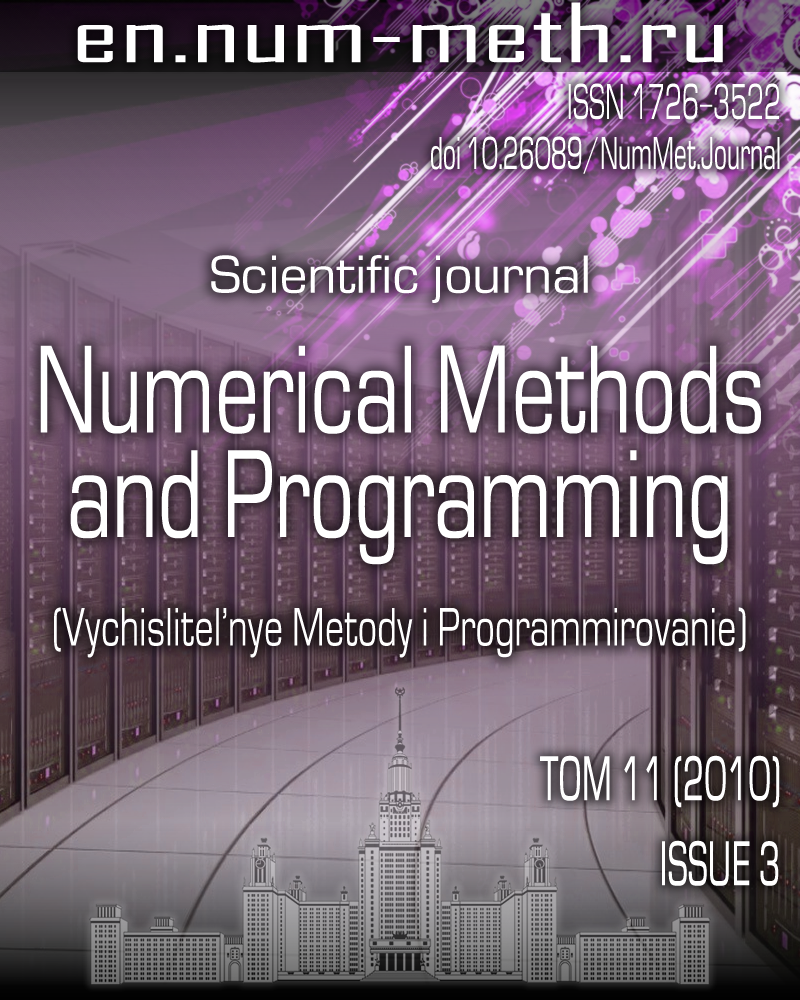Modeling of separated flows in CFD software FlowVision-HPC
Keywords:
Navier-Stokes equations
turbulence model
wall functions
airfoil
computational grid with subgrid resolution of geometry
Abstract
A new subgrid turbulence model for near-wall cells is proposed. The model is based on the method of wall functions and takes into account the pressure gradient (both positive and negative). The model includes a smooth profile of tangential velocity, a smooth profile of turbulent viscosity, and a special profile of the dissipation rate of turbulent energy. The profile of tangential velocity is combined from the experimental zero-gradient and separation profiles. The proposed model is implemented in CFD software FlowVision-HPC and is verified using 2D test cases. Flows past straight and curvilinear walls are studied.
Published
2010-09-09
Issue
Section
Section 1. Numerical methods and applications
References
- Wilcox D.C. Turbulence modeling for CFD. DCW Industries, Inc., 1994.
- Шлихтинг Г. Теория пограничного слоя. М.: Наука, 1974.
- Shih T.-H., Povinelli L.A., Liu N.-S., Potapczuk M.G., Lumley J.L. A generalized wall function // NASA/TM. 1999. 209398.
- Utyuzhnikov S.V. The method of boundary condition transfer in application to modeling near-wall turbulent flows // Computers &; Fluids. 2006. 7. 1193-1204.
- Souders D.T., Hirt C.W. Modeling roughness effects in open channel flows // FSI-02-TN60.
- Aksenov A.A., Dyadkin A.A., Pokhilko V.I. Overcoming of a barrier between CAD and CFD by the modified finite volume method // Proc. of 1998 ASME Pressure Vessels and Piping Division Conference, San Diego, ASME PVP. 1998. T. 377-1 .
- Aksenov A.A., Gudzovsky A.V., Serebrov A.A. Electrohydrodynamic instability of fluid jet in microgravity // Proc. of 5th Int. Symposium on Computational Fluid Dynamics (ISCFD). Aug. 31-Sept. 3, 1993. 1 . Sendai: Japan Society of Computational Fluid Dynamics. 19-24.
- Сушко Г.Б., Харченко С.А. Экспериментальное исследование на СКИФ МГУ «Чебышев» комбинированной MPI+threads реализации алгоритма решения систем линейных уравнений, возникающих во FlowVision при моделировании задач вычислительной гидродинамики // Тр. Международной научной конференции «Параллельные вычислительные технологии (ПаВТ 2009)’’. Нижний Новгород. 30 марта-3 апреля 2009. Челябинск: Изд-во ЮУрГУ, 2009. 316-324.
- Харченко С.А. Влияние распараллеливания вычислений с поверхностными межпроцессорными границами на масштабируемость параллельного итерационного алгоритма решения систем линейных уравнений на примере уравнений вычислительной гидродинамики // Тр. Международной научной конференции «Параллельные вычислительные технологии». Санкт-Петербург. 28 января-1 февраля 2008. Челябинск: Изд-во ЮУрГУ, 2008. 494-499.
- Kim J., Kline S.J., Johnston J.P. Investigation of a reattachment turbulent shear layer: flow over a backward-facing step // Transactions of the ASME. Journal of Fluids Engineering. 1980. 102. 302-308.
- Eaton J.K., Johnston J.P. A review of research on subsonic turbulent flow reattachment // AIAA. 1980. AIAA-80-1438.
- Gregory N., Wilby P.G. NPL 9615 and NACA 0012. A comparison of aerodynamic data // Ministry of Defense, Aeronautical Research Council. London: Her Majesty’s Stationery Office, 1973. C.P. N 1261.
- Кашафутдинов С.Т., Лушин В.Н. Атлас аэродинамических характеристик крыловых профилей. Новосибирск: Сибирский НИИ Авиации им. С.А. Чаплыгина. 1994.


